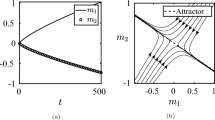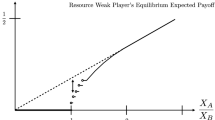In the partition function bargaining problem the value of a coalition depends on the coalition structure in which it is embedded. This paper applies the demand-making bargaining game of coalition formation to the three-player partition function bargaining problem. The values of some embedded coalitions appear to be strategically irrelevant. The strategically relevant values constitute a coalition function bargaining problem. A classification in terms of the associated coalition function bargaining problem is provided. For one of the three classes that are distinguished the set of equilibrium outcomes closely relates to the core of the associated coalitional problem. For another class of problems the equilibrium outcome corresponds to the Von Neumann-Morgenstern outcome.
Similar content being viewed by others
Author information
Authors and Affiliations
Additional information
Received: February 14, 2000; revised version: December 13, 2002
RID="*"
ID="*" I would like to thank Harold Houba and Gerard van der Laan for valuable discussions, and an anonymous referee for helpful comments. This research was conducted while I was at the Vrije Universiteit Amsterdam.
Rights and permissions
About this article
Cite this article
Cornet, M. Partition function bargaining with public demands. Econ Theory 22, 845–862 (2003). https://doi.org/10.1007/s00199-002-0356-x
Issue Date:
DOI: https://doi.org/10.1007/s00199-002-0356-x




